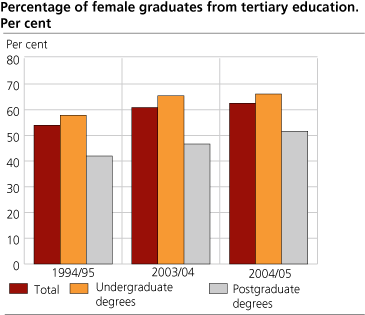Content
Published:
This is an archived release.
Male postgraduates outnumbered by females in 2004/05
While female students have outnumbered males in tertiary education for over a decade, males have held onto the majority when it came to completion of degrees longer than 4 years. For the first time in 2004/05, female postgraduates have outnumbered the men, accounting for 52 per cent of graduates of higher-level tertiary degrees.
Women completing higher education have been outnumbering their male counterparts for the past decade and in 2004/05, accounted for nearly two-thirds of the 31 323 graduates from Norway's universities and colleges. Despite the dominance of women in tertiary education, men have continued to dominate tertiary degrees longer than 4 years in duration. For the first time in 2004/05, female postgraduates have eclipsed the males, taking home 52 per cent of the 7 848 higher-level tertiary degrees awarded. Doctoral degrees are considered separately to normal tertiary education in Norway. Males completed the majority of doctoral degrees, although more females than males were awarded doctorates in Primary Industry fields in 2004/05.
Stagnation in number of tertiary graduates
While the total number of tertiary degrees awarded in Norway has increased by 20 per cent over the past decade, no increase occurred in 2004/05 compared with the previous year. Female graduates have been primarily responsible for long-term increases in student graduates, and although 2004/05 saw an increase of around 500 female graduates, the number of male graduates dropped by a corresponding amount compared to the previous year. Male graduates have in fact declined since 1994/95, with only 11 800 graduates in 2004/05 compared with 12 000 ten years previously. In the same period, female graduates have increased by almost 40 per cent from 14 100 to 19 600.
Health, Welfare and Sport most popular undergraduate courses
The most productive undergraduate courses in 2004/05 were Health, Welfare and Sport, where 85 per cent of the 7 400 degrees were awarded to women. Teacher Training and Pedagogy was the next most popular field of education, with 5 600 undergraduate degrees completed in 2004/05.
Fewer undergraduates in Business and Administration
While Business and Administration remains one of the most popular undergraduate fields, there were 20 per cent fewer graduates in 2004/05 compared with ten years ago. In contrast, postgraduate degrees in Business and Administration have seen a boom over the past decade. Although 2004/05 saw a small 2 per cent reduction compared with the previous year, the number of higher-level tertiary degrees awarded in this field has tripled since 1994/95. Natural Sciences, Vocational and Technical Subjects were the most productive higher-level courses in 2004/05, although numbers are diminishing.
Tables:
- Table 1 Graduates, by level of degree, type of institution and gender. Final figures. 1994/95, 2003/04, 2004/05
- Table 2 Graduates, by gender and field of education. Final figures. 1994/95, 2003/04, 2004/05
- Table 3 Graduates, by gender and field of education. Final figures. 1994/95, 2003/04, 2004/05
- Table 4 Graduates of doctoral degrees, by field of education and gender. Final figures. 1994/95, 2003/04, 2004/05
Contact
-
Beate Bartsch
E-mail: beate.bartsch@ssb.no
tel.: (+47) 40 81 14 96
-
Nawid Fazli
E-mail: nawid.fazli@ssb.no
tel.: (+47) 97 09 77 18
-
Geir Nygård
E-mail: geir.nygard@ssb.no
tel.: (+47) 48 15 13 44

